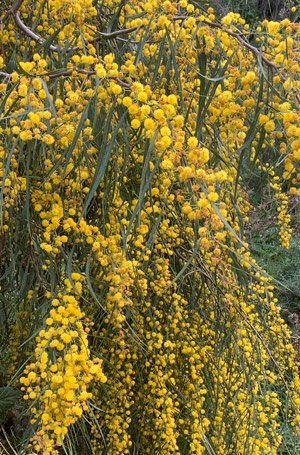Acacia is a lot of times called mimosa. But this is not the same plant. Native to Asia, Australia, and tropical countries, wattles or acacias are similar to the mimosa tree but can be distinguished from it by the following:
- mimosas have pink flowers in terminal clusters that look like a small pom-pom, whereas acacia flowers are yellow or white
- mimosas bloom around July while acacias blossom in late winter or very early spring
- acacias have thorns and mimosas don't.
Acacias might release a lot of pollen and bring about your spring allergies. They have however multiple beneficial medical and cooking benefits. Here are some:
- acacia gum can relieve stomach or throat discomfort
- acacia is often used as a topical treatment for wounds and some scientists think it can heal ulcers
- powdered acacia can clean and clear plaque from your teeth
- acacia gum can keep your body fat in check and is a good source of fiber
- acacia gum can soothe sore throats
- acacia extract can enhance your immune system
- it is believed that acacia can reduce leukemia, liver swelling, or blood clotting.
While acacia can be used in gum or powder form in foods or drinks, it is very important to consult your doctor before consuming any and make sure that you don't mess with the dose your body can process. It is not toxic but if you are sensitive to dust, pollen, if you are pregnant or taking another treatment at the same time such as antibiotics, acacia can cause unpleasant side effects ranging from nausea and diarrhea to more serious symptoms.

